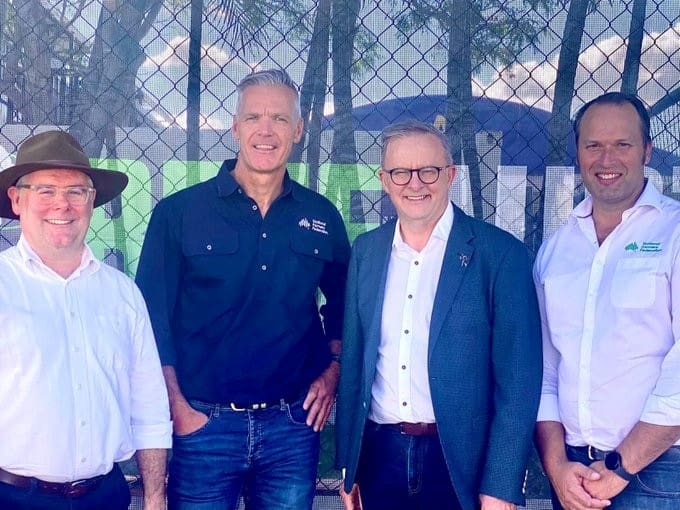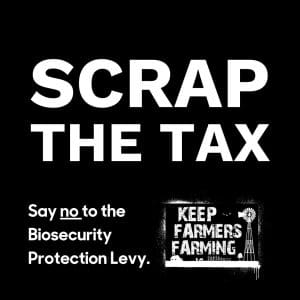
Smiling, but still divided on the biosecurity levy. Minister for Agriculture Fisheries and Forestry Murray Watt, left, with NFF CEO Tony Mahar, Prime Minister Anthony Albanese and NFF president David Jochinke at Beef2024.
AGRICULTURE maintained the rage against the Federal Government’s proposed biosecurity protection levy with a National Day of Action and protest at Beef2024 in Rockhamption today.
A Senate inquiry into the proposed levy is due to report by 10 May, and enabling legislation is due to be voted on in parliament next week, with the Federal Budget scheduled for Tuesday 14 May.
Today Australian agriculture will band together to take a stand against the Biosecurity Protection Levy, calling on the Federal Government to #ScraptheTax and #KeepFarmersFarming, the National Farmers Federation said in a media statement.
The NFF said on the National Day of Action, the federation and its members, comprising all of Australia’s major agricultural commodities across the supply chain, “will send a message to politicians and the public about why this tax is unfair and must be binned ahead of it being voted in the Senate during Budget Week.”
Nationals launch petition against biosecurity ‘fresh food tax’ levy
The Nationals also today launched a new petition against the proposed biosecurity levy, that National Leader David Littleproud has labelled Labor’s fresh food tax.
Stop the Fresh Food Tax, https://www.stopthefreshfoodtax.com/#action, was launched at Beef2024 to coincide with the National Day of Action.
Mr Littleproud urged all Australian farmers and families to get behind the campaign and sign the petition to stop Labor’s new fresh food tax.
“The Nationals proudly stand with the National Farmers’ Federation today and support our farmers on their day of action to scrap the tax,” Mr Littleproud said.
“We urge families and farmers to join us in this fight and to sign the petition to stop Labor’s fresh food tax.
“This new tax will hurt almost all Australians, because farmers will be forced to pass on costs, meaning families will feel more pain at the grocery checkout.”
Parliamentary battle for votes continuing
National Farmers Federation president David Jochinke said all agriculture rejects the BPL proposal because it is being collected into consolidated revenue and there will be no industry oversight over what the levy would achieve.
“But more importantly, we already contribute to the national control of pests, weeds and diseases through R and D levies and also for the fact that if there is an incursion we’ve got to pay back any funds that the government puts into agriculture for mopping up.
“We think we’ve covered our obligations and we’ve had university and economic reviews of the process and they’ve even found that the risk makers should be the ones that pay the cost of the biosecurity risk that they are creating.”
 Mr Jochinke said the NFF had spoken to the Minister for Agriculture Fisheries and Forestry “and he is firm in his resolve that the farmers need to contribute to the levy – taxpayers are contributing therefore farmers have to contribute.”
Mr Jochinke said the NFF had spoken to the Minister for Agriculture Fisheries and Forestry “and he is firm in his resolve that the farmers need to contribute to the levy – taxpayers are contributing therefore farmers have to contribute.”
“Oure response to that is that as farmers we already contribute to taxation as well, so you are going to be hitting us twice,” Mr Jochinke said.
“We are also taxpayers and in many areas, agriculture is the biggest economic game in town.”
Mr Jochinke said the Federal Government firstly has to get the BPL legislation passed through parliament.
“So we’ve been working quite heavily with the cross-bench to make sure that they understand our issues, even to the extent that we’ve got a few more tele hook-ups with senators next week to have this discussion.”
Mr Jochinke said Greens have been silent on the levy legislation.
“But we still live in hope that commonsense will prevail and that this legislation is amended so that the risk makers are the ones paying.
“The show’s not over as far as we are concerned,” he said.
“The Coalition, Greens and independents have already shown their support for farmers, voting against the levy in the lower house. We call on them to continue to back Aussie farmers and do the same in the Senate,” Mr Jochinke said.
On 21 March 2024, the Senate referred the Agriculture (Biosecurity Protection) Levies Bill 2024 [Provisions], the Agriculture (Biosecurity Protection) Charges Bill 2024 [Provisions] and the Agriculture (Biosecurity Protection) Levies and Charges Collection Bill 2024 [Provisions] to the Rural and Regional Affairs and Transport Legislation Committee for inquiry and report by 10 May 2024.
Mr Jochinke the NFF is waiting for the inquiry’s report which is believed to “imminent.”
“We believe that for the economic case, let alone the practicalities of the (BPL) proposal, that it shouldn’t be going ahead.”
Livestock SA joins National Day of Action against proposed levy

Livestock SA president Joe Keynes.
Livestock SA president, Joe Keynes said South Australia’s red meat and wool producers continued to hold significant concerns about the proposed new tax and remained staunchly opposed to its introduction.
“On this National Day of Action, Livestock SA again voices our opposition to the introduction of a new biosecurity tax, which has been flawed from the outset.
“Although amendments have been made to what the government originally proposed in last year’s Budget, a range of unacceptable issues remain,” he said.
“The structure of the proposed tax doesn’t follow the usual rules for collecting and using industry levies, doesn’t align with the National Biosecurity Strategy, and doesn’t provide appropriate accountability to industry on how funds raised will be spent.
“The other really disappointing element is that the significant investment producers make towards biosecurity every year seems to have been ignored,” he said.
“We commend the Federal Government for its commitment to addressing the issue of sustainably funding the biosecurity system, but this new tax on producers is not the way to go.
“South Australian livestock producers contribute to the biosecurity system at multiple levels – on-farm investment, state-based levies, statutory federal levies, and general taxation,” he said.
“Finding ways to increase revenue from the risk creators, such as a container levy, and having a more holistic view on who benefits from a strong biosecurity system will realise a fairer and more equitable outcome.
“Simply taxing producers more because convenient revenue collection mechanisms are already in place through industry levy structures is not the answer.”
After limited consultation, the government decided the rate of the proposed BPL will no longer be set equivalent to 10 percent of 2020-21 agricultural levy rates (as originally announced in Budget 2023-24). Instead, rates will be based on each industry’s proportionate share of the total gross value of production (GVP) for the total agriculture, fisheries and forestry sector. However, the revised contribution model is still generally opposed by the agricultural sector.
Further information about the consultation and design are available on the department’s website at: www.agriculture.gov.au/biosecurity-funding



Politicians making these laws have rarely had much real agricultural experience, so are unaware of essentials of farming like weather, markets and changing trade prices. Agriculture is one of the nation’s strongest industries, but is not recognised as such by non-farmers, who instead see big commercial processes as more effective. Where do these politicians eat?